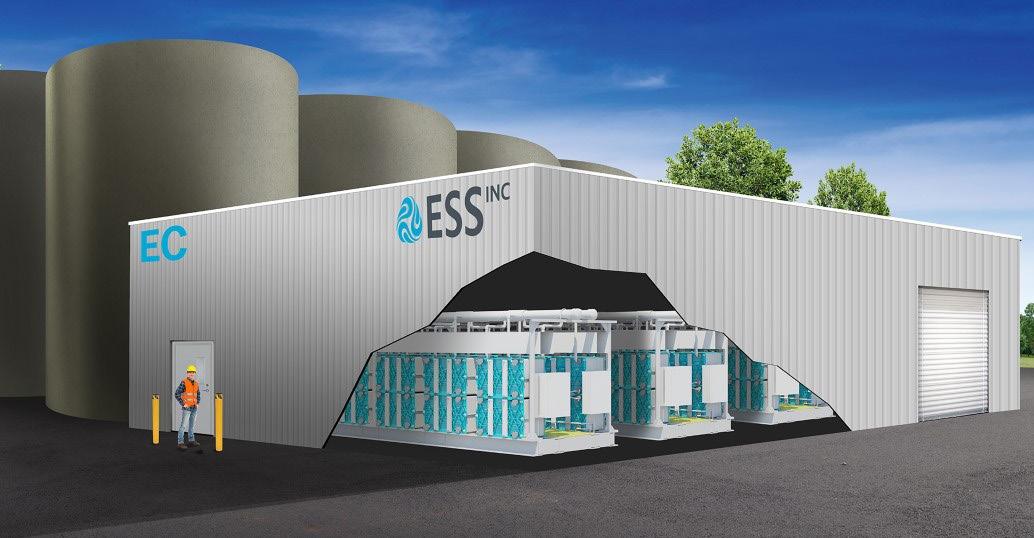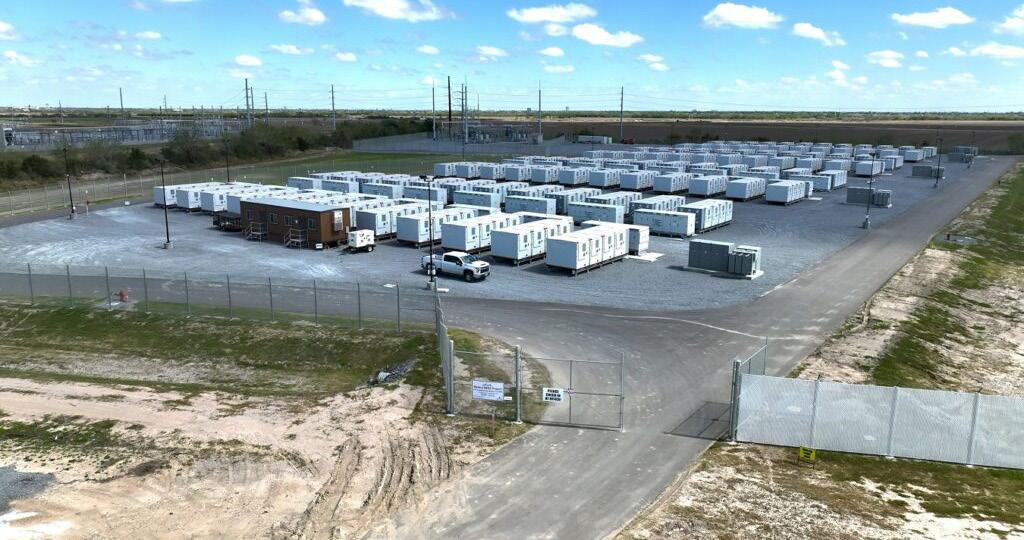
7 minute read
PORTLAND WILL ESTABLISH A NEW 400MW BESS INSTALLATION
UTILITY COMPANY NEEDS 1,250MW OF RENEWABLE ENERGY BY 2030
Portland General Electric, the utility serving Portland, Oregon, has announced it is putting in the second-largest battery storage installation in the United States, at 400 MW of power. The significance of such projects is they diminish the need for power plants that burn fossil fuels that warm the planet.
The only larger standalone project in the country is Vistra Moss Landing in California, currently at 400 MW, but it will soon add an additional 350.
The Portland project will generate enough electricity for around 260,000 homes, roughly the size of the city, for four hours at full power.
“Although we are a small utility, I like to think we punch above our weight,” said Brett Greene, PGE’s senior director, calling it an important step towards reducing carbon emissions 80% by 2030.
Batteries are playing a critical role in the clean energy transition because they supply electricity during times of low sunlight and wind, and can also prevent blackouts when demand for electricity surges, such as heat waves. The battery power during peak periods also helps avoid the need to buy “extremely expensive” energy from other utility providers, Greene explained.
“Batteries are like a huge refrigerator for electrons,” said Shirley Meng, a professor at the University of Chicago’s Pritzker School of Molecular Engineering.
“Batteries let us capture electrons created when sunlight strikes solar panels or the wind spins a turbine, which is how we can use solar power at night after the sun has set, for example,” Meng explained.
Jiangbiao He, an assistant professor of engineering at the University of Kentucky, said: “Batteries also help the grid cope with “rush hour,” when energy usage spikes around 5 p.m. as people come home from work and turn on lights, start cooking and run their air conditioning,.”
ZERO-EMISSIONS BRAND EMERGES FROM COMPANY BUYOUT
Cummins Inc. announced the buyout of Air Liquide’s 19% interest in Hydrogenics Corp. Cummins acquired Hydrogenics in 2019, adding key fuel cell and electrolyzer technologies to its portfolio. It is now housed under Cummins’ zero-emissions brand, Accelera by Cummins. Terms were not disclosed.

Cummins said the buyout reinforces its commitment to these technologies and the increasing importance they will play in creating value for all stakeholders and decarbonizing the globe. The move is expected to enable continued investment and growth in hydrogen technologies to meet rapidly growing demand.
Air Liquide said that under Cummins’ ownership, Hydrogenics will remain one of its suppliers for its own electrolyzer projects. Electrolyzers are considered an ideal way to balance the growing share of renewable energy in power grids. They allow more renewable power to enter into the energy system for power production, injection in gas grids, industrial use, ammonia production, renewable fuels, or use in mobility, such as in fuel cell electric vehicles. Hydrogenics is a developer and manufacturer of hydrogen generation and fuel cell products based on water electrolysis and proton-exchange membrane (PEM) technology. Hydrogenics is divided into two business units: OnSite Generation and Power Systems. Onsite Generation is headquartered in Oevel, Belgium. Power Systems is based in Mississauga, Ontario, Canada, with a satellite facility in Gladbeck, Germany. Hydrogenics maintains operations in Belgium, Canada and Germany, with offices in the Indonesia, Malaysia and the USA.
Colorado Springs Utilities intends to release a request for proposals to secure 1,250 MW of new renewable energy and energy storage capacity by 2030.
The utility is seeking approximately 525 MW of solar, 100 MW of energy storage, and 625 MW of wind capacity, in addition to 350 MW of natural gas.
The solicitation is part of Colorado Springs Utilities’ effort to reduce its carbon emissions by 80% by the end of the decade. The target date for new resources to be integrated is May 2028.
While the procurement targets are based on a preliminary analysis, Colorado Springs Utilities said it is open to exploring alternative technology types and a combination of resources that align with its reliability and sustainability goals.

The RFPs will provide potential bidders with an opportunity to propose various resource types and commercial structures such as power purchase agreements, build-operate-transfer arrangements and Colorado Springs Utilities ownership models.
GEP, a global procurement and supply chain consulting firm, will serve as the procurement advisor for the RFPs.
Colorado Springs Utilities and three other utility companies operating in Colorado are currently seeking new sources of renewable natural gas as part of ongoing statewide efforts to reduce greenhouse gas emissions.
Colorado Springs Utilities, Atmos Energy Corporation, Black Hills Energy and Xcel Energy-Colorado have issued a joint request for information seeking future developers of renewable natural gas.
“This is the beginning of what’s going to be a long-term project for all utilities in the state ... to provide renewable natural gas for our systems,” comments Tom Henley, senior community program manager at Black Hills Energy. The request will help each of the four utilities meet new Colorado laws passed in 2021 for clean heat sources, utilities officials said on their respective websites.
NEW DISTRIBUTOR FOR CANADA’S BRITISH COLUMBIA

FPT Industrial announced a strategic partnership which allows Klassen Diesel, a distributor of diesel engines for marine and industrial applications, to represent FPT Industrial in Canada’s British Columbia and Yukon provinces.
“FPT Industrial is pleased to welcome Klassen Diesel to our distribution network in North America,” said Braden Cammauf, vice president of FPT Industrial Brand North America. “Klassen Diesel’s strength and reputation in diesel engine sales and supporting their customers makes them a great fit for the brand family. They will be able to offer their customers a wider range of engines from 42 to 1000 hp to fulfill their needs.”
Founded in 1965 and based in Delta, B.C., Canada, Klassen Diesel has grown through the sale of marine engines and generator sets to construction companies, fisheries, forestry, mining and other endusers. The company’s marine engines power a range of vessels, from water taxis on Vancouver, B.C.’s inner harbor to salmon seiners and
Linden
Cogeneration has completed the commissioning of its hydrogen blending initiative, which aims to reduce carbon emissions from power and steam generation.
Linden Cogen is a 972 MW natural gas-fired cogeneration plant located in Linden, New Jersey. The facility, which began operating in 1992, has six gas turbines and three steam turbines. With modifications that include PSM’s FlameSheet system, Linden Cogen is now taking refinery off gas containing hydrogen produced by the Phillips 66 Bayway Refinery and blending it with natural gas to fuel the unit 6 gas turbine.
“Actual reductions will be based on how much hydrogen is used at any given time of plant operation, but the joint project is expected to reduce overall CO2 emissions by approximately 10% of annual CO2 emissions from the unit 6, while staying within the gas turbine’s stringent NOx emission requirements,” said Todd Kerschbaum, Chief Technical Officer for JERA Americas.
Linden Cogen is owned by JERA Americas (50%), EGCO (28%), DBJ (12%), GS-Platform Partners (10%).
Power and steam produced from the plant is supplied for industrial use under long-term contracts, while most of the electricity is sold into the New York Independent System Operator and PJM power markets.
Linden Cogen is a CCGT with Cogen power plant. The power plant run on dual-fuel. The primary fuel being used to power the plant is natural gas. In case of shortage of natural gas the plant can also run on Waste Oil. The fuel is procured from PSE&G Pipeline. The project has generated 5,088,263MWh of electricity.
Hydrogen has an important role to play in decarbonising emissions across a variety of different sectors including heating, transport, industry and power generation, according to a new report from the Climate Change Committee (CCC). If used in conjunction with energy-efficiency heat pumps and expanded reliance on renewable energy sources, hydrogen could eventually displace fossil fuels as a major energy source of tomorrow.
However, in order to be both cost-effective and environmentally-friendly, low-carbon hydrogen would have to be produced on a mass scale and accompanied with carbon capture and storage (CCS) technology. This would most likely be created using natural gas (including shale and potentially biomethane) and would still entail a significant outlay.
Industrial heat generation is one of the biggest contributors of carbon to our atmosphere, so a lowcarbon hydrogen solution could have a huge impact on the sector’s emissions. It would also be wellsuited to reducing emissions in specialised sectors such as the food and drink industry. Power generation. As long as natural gas power plants are made “hydrogen-ready”, it could replace the fossil fuel as a primary energy source and work in tandem with the electricity generated by renewable sources.
Challenges facing the industry include:
*CCS. Without adequate CCS technology, it will be impossible to achieve low-carbon hydrogen production, which makes the use of the substance more damaging than helpful. At the moment, hydrogen production methods emit huge amounts of carbon and it’s unfeasible to consider using renewables to create hydrogen on a large scale.
*Awareness. At present, the public has little idea about the existence of alternatives to traditional forms of energy generation and home heating (i.e. gas) and even less grasp of why transitioning to those alternatives is important. As such, educational and awareness-raising campaigns must be enacted. Strategy. As yet, there is no coherent strategy on transitioning away from fossil fuels in the long-term. Creating a bespoke hydrogen plan within the next three years will be imperative in ensuring that the source can act as a viable alternative for gas going forwards.
Linden
Cogen’s onsite turbines
GE Power was selected as the turbine supplier for the gas-fired project mentioned above. The company provided 5 units of 7E.03 gas turbines, each with 95.2MW nameplate capacity. GE Power was also selected as the turbine supplier for the gas fired project. The company provided 3 units of D11 steam turbines, each with 95.2MW nameplate capacity. The common GE® D11 steam turbine, a single-casing HP/IP design used extensively in combined cycle applications, is demanding increased focus during normal outages, and ongoing attention for reliability, efficiency, and plant safety. Units modified for higher efficiencies and compatibility with 7FA Gas Turbine exhaust temperatures are subject to the even higher rotor to casing differential thermal expansions in the more tightly-packed seal areas of this single-casing design.










